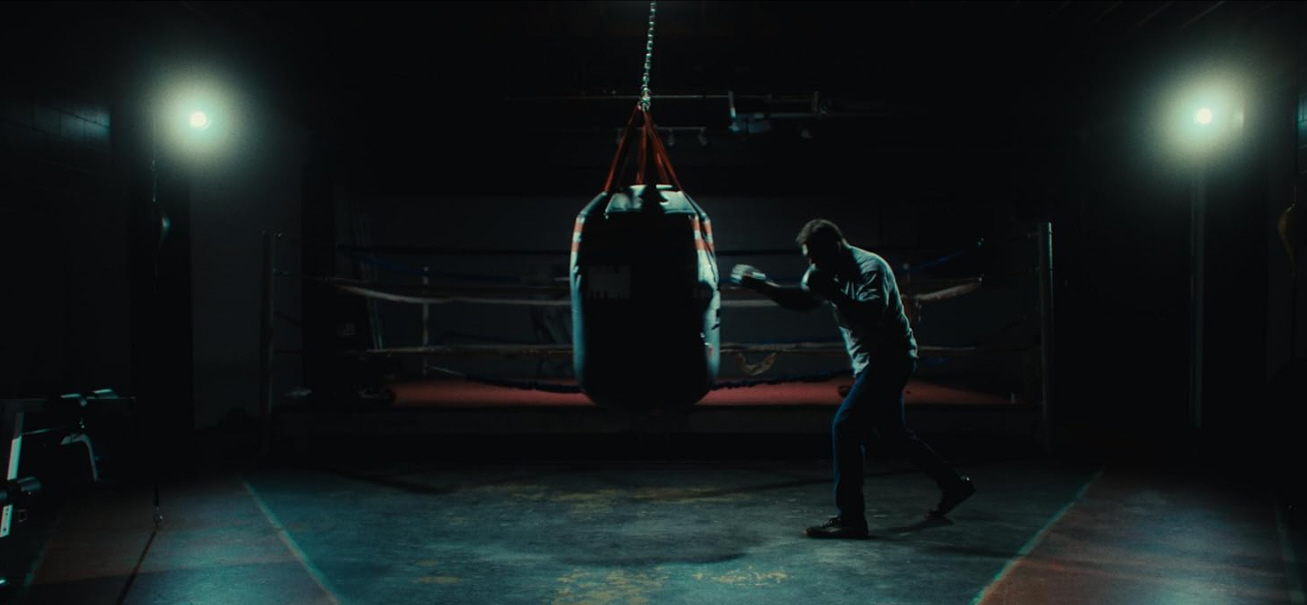Jai (Vishy Ayyar) is a taciturn ex-con working as a janitor at Marcella’s Boxing Gym. When he’s asked to train a new hire (also an ex-con) on the job, the new guy chatters away, trying to engage Jai in conversation, but Jai isn’t having any of it, telling the guy just to focus on the job. He is so focused on isolating himself that even when he finds the earing employee Melissa (Taylor Treadwill) has lost, he denies having done it, just to shut the conversation down quickly. The only person who seems to be able to bring Jai out of his shell is his sister, Priya (Suleka Mathew), the only person in his sprawling Indian-American family who still talks to him. Jai isn’t impolite, exactly; he just doesn’t give people openings, shutting down even their polite attempts at conversation.
But one evening Jai is forced to engage. When he’s at his usual convenience store, a man assaults the owner and tries to rob him. Jai immediately attacks, the police are called in, and Jay is handcuffed along with the attacker. The store owner vouches for him, saying the security cameras would back him up. Then he gives Jay a bottle of booze to thank him, which Jai thinks is unnecessary – obviously he is someone who just wants to do the right thing. And that would have been the end of it if it hadn’t been for the people who recorded Jai capturing the thief using an MMA move on their phones, the video going viral on the internet.
One of the things that American Warrior explores is the power that social media holds in our world. Jai is confronted by an absolutely annoying “fitness influencer” who wants a selfie with him. Marcella (Veronica Falcón), the tough gym owner who knows how to motivate her staff, tells Jai that the attacker was an MMA fighter, and she, too, wants to harness the power of social media to draw attention to her gym, telling Jai to “retweet, repost, hashtag the gym and there you go”. These interactions show clearly how social media impacts our lives, even if we don’t want it to. Jai could walk away from it all, especially as initially what people want from Jai is to use what he did to benefit them in some way. Jai just wants to do his job and be left alone.
But the experience leaves Jai changed. He decides to ask Melissa out, even if their initial conversation is delightfully awkward. Melissa, though, brings him around to the subject of fighting again, and when Jai says he’s just too old, she shows him that he’s trending online – “hashtag The Janitor” – and Jai makes the decision to step into the ring, to take control of the narrative that social media has begun building for him.
American Warrior is, ultimately, a film about redemption – how do you figure out who you are when you have to rebuild your life? What parts of your past should you leave behind? What parts of your past can you carry forward? How do you convince your family that you’ve reformed, that you’re worthy of being part of their celebrations again? Priya invites him to celebrate Diwali again with them, and he brings Melissa along, telling her that it’s “a day to remember your inner light”, something Jai is surely in need of.
As a sports film, American Warrior follows all the familiar beats, all the familiar tropes – the outsider without much of a chance, who needs that fight for personal reasons. The grizzled trainer, Dennis (Danny Trejo), who has to be coaxed back to help Jai, but who, when he decides to do it, is totally on Jai’s side. It means that the film doesn’t break much new ground there, but it keeps us engaged because we end up rooting for Jai – we understand he’s paid the price for what he did, and that he’s done the work to reclaim his life, his dignity, and to build a new future for himself. Jai begins the film as the down and outsider – he ends it with the audience, both on screen and off, rooting for him at the hands of a totally dirty fighter who embodies everything Jai doesn’t.
In the end, Jai decides to fight under his own name, Jai Kumar, instead of his pseudonym, Jai Badshah. It’s a moment that symbolizes that he’s ready to retake his life, that he’s not willing to hide, that he wants to move beyond the shame that’s kept him quiet and reticent. When he wins the fight – as we know he will – his face moves from disbelief to happiness, and we want to cheer for him as the crowd does, loudly and raucously. It’s Jai’s moment of redemption, come full circle, the moment when he finds his own inner light.

